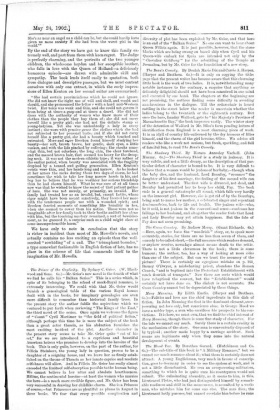Mary Manning. By Edith Eustis. (Harper and Brothers. 6s.)—Politics and
love are the chief ingredients in this dish of fiction. In John Manning the first is the dominant element, over- powering not love only, but conscience also ; in George Hood we have a nobler type, a man who sacrifices his prospects to his con- victions. It is here, we must own, that we find the chief interest of Mary Manning, though there is some fine study of character. For the tale we cannot say much. Surely there is a certain crudity in the mechanism of the story. One man is conveniently disposed of by typhoid ; another made happy by a carriage accident. Such means are legitimate only when they come into the natural development of events.






































 Previous page
Previous page